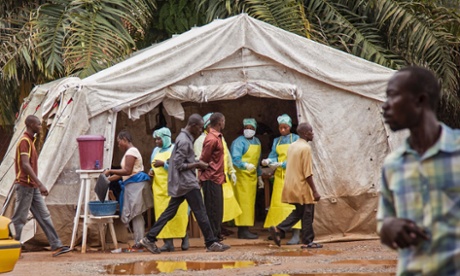
Rich in raw materials, the major countries that have been hit by the outbreak - Liberia, Guinea, Sierra Leone and Nigeria - are all heavily dependent on mining. Globally recognized firms Rio Tinto and Vale, as well as smaller companies such as Sierra Rutile and London Mining, have been forced to act since the outbreak, which has killed more than 1,000 people since it began in March.
The responses of these international companies have varied. Some are attempting to help contain the crisis; others have withdrawn their international employees from the region. The majority are providing financial donations and have increased sanitation to workers to help tackle the disease. For example, Rio Tinto, the world’s third largest mining company, who owns a share of the Simandou project in eastern Guinea, has donated $100,000 to the World Health Organization’s (WHO) work in the area and is making additional sanitation supplies and equipment available to “the communities in which staff live and work”.
By contrast, the world’s biggest iron ore producer, Vale, who was involved in the Simandou project until late April, was reported to have evacuated six international members of staff and put the rest of its workforce in the area on leave. There has been no information released on whether the company helped to contain the virus. Vale declined requests from the Guardian to confirm reports or explain their response to the outbreak.
Smaller firms, however, such as London Mining and Sierra Rutile, who operate in Sierra Leone, have also donated money in efforts to tackle the spread of the disease, much of which will be used to educate local communities about the virus. This is the biggest challenge in the fight against the outbreak, says WHO spokesperson Gregory Hartl. Because of this, more companies operating in affected countries are being called on to educate local communities and their workforces. “Any company or organisation who can help spread proper education about Ebola and how one can protect themselves and others, that we need,” says Hartl.
But are the actions of these international mining companies helping communities deal with the health crisis, or do these measures primarily function to protect operations and enhance reputations? “The first thing to be aware of is this is a response to an emergency that can impact their business,” says Professor Bobby Banerjee, who carries out research in the areas of sustainability, climate change and corporate social responsibility at London’s Cass Business School.
“The extractive industry’s response to a crisis is often to protect assets so that mining continues without any impact and then greenwash your way through the issue,” Banerjee says. These actions, such as providing donations and sanitation to workers, deflects attention from some of the social, cultural and environmental impacts of their operations.
But in a rush to protect their assets, mining companies can contribute to an already bad situation. The World Food Programme (WFP), in April, said the state of higher vulnerability in Guinea, due to the epidemic, has been worsened by “suspension of activities and/or withdrawal of several large mining companies”. This has led to unemployment and loss of income to access food resources, says the WFP. Banerjee says the mining industry is certainly not the only one to hold accountable for these issues: “The fact that poverty is a major cause of this virus means industry and governments are equally accountable. It is an easily solvable problem, yet the state and the market have both failed.”
International organisations are now stepping up their role. Earlier this week, the WHO announced that offering unproven treatments would be an option for treatment or prevention, throwing further debate on how to deal with the crisis ethically.
The severity of the outbreak also forced US president Barack Obama to address the situation at the recent US-Africa leaders summit, held in Washington DC earlier this month. “The United States and our international partners will continue to do whatever we can to help our African partners respond to this crisis with the people of Guinea, Liberia and Sierra Leone,” the president said. “In their histories they have overcome great challenges and they are drawing on that same strength and resilience today.”
And like international governments, industries’ response to the epidemic has been under the watchful eye of NGOs and the public. Plan International says that rich nations and emerging economies must be generous and deploy all possible resources to accelerate the fight against Ebola. The response has been massively underfunded, it says.
Banerjee says that a crisis like this highlights the mining industry’s responsibility to look beyond its environmental impact and consider how to address issues such as the equitable distribution of resources and health care.
To establish this, one has to look at corporate social responsibility over the years and decipher what the mining industry’s contribution to basic health and sanitisation issues outside of their plants and operations are. The trends show that there has been an obsession with “supply-side CSR”, which is about managing reputation and the financial benefits without much consider for how effective it might be: “It’s obvious that this is about, firstly, making sure operations continue and employees and contractors are safe and able to work, and most importantly to come out of the issue with reputations enhanced.”
Rio Tinto’s $100,000 donation to help contain the spread of the virus has not been part of a more comprehensive long-term plan. Banerjee speculates that this is due to a lack of consideration for the outcome.
“The Ebola health crisis is actually a good opportunity for the mining companies, given the criticism they have taken over the years, to show how much good they can do,” says Banerjee. “But often, two years later, it’s business-as-usual.”
The social impact hub is funded by Anglo American. All content is editorially independent except for pieces labelled advertisement feature. Find out more here.

